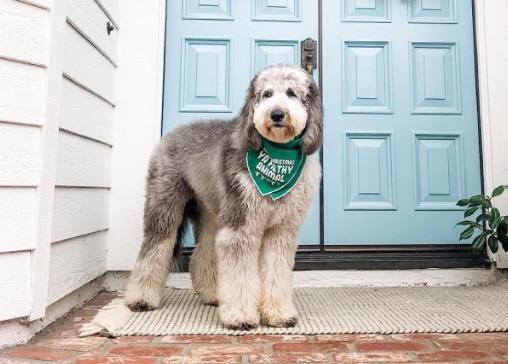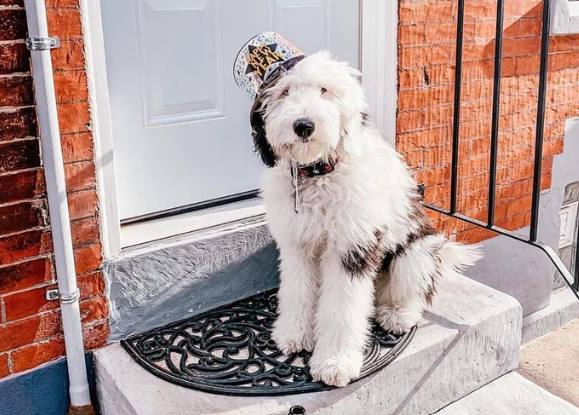Sheepadoodles are quickly becoming one of the most popular dog breeds, thanks to their endearing “teddy bear” looks and friendly personalities. As a relatively new hybrid breed, sheep doodles have captured the hearts of many families, individuals, and seniors looking for an ideal furry companion.
We will cover everything you need to know about Sheepadoodles, from their history and appearance to their temperament and health. We will also give you some tips on how to care for, train, and groom your Sheepadoodle.
History and Origins of the Sheepadoodle

The sheepadoodle is not an officially recognized breed but rather a hybrid cross between two purebred parent breeds:
Old English Sheepdog
- Ancient herding dog from England
- Known for intelligence, strength and stamina
Poodle
- Originated as a water retriever in Germany or France
- Became popular across Europe as a versatile breed
- Prized for trainability, intelligence, and low-shedding coat
The first deliberate crossing between an Old English Sheepdog and a poodle is believed to have taken place in the 1960s. The goal was to create an intelligent military working dog with strength, agility, and problem-solving abilities.
This early sheepadoodle project was discontinued, but interest in the breed was renewed in the 2000s by breeders looking to develop a friendly, low-shedding family dog.
The current sheepadoodle breed originated from breeder Lori Schrock. She originally called her poodle/sheepdog cross the “Sheeppoo” before transitioning to the now-common name “Sheepadoodle.”
Today, the popularity of sheepadoodles continues to skyrocket thanks to their charming looks and winning personalities.
Sheepadoodle Appearance: Size, Weight and Coat

Sheepadoodles range considerably in size, weight, and coat qualities depending on their poodle and sheepdog parentage.
Size
Standing 16-22 inches tall at the shoulder, most sheepadoodles are solidly in the “medium” to “large” dog categories.
Sheepadoodle Size Based on Parent Breeds
| Parent Breeds | Average Height | Average Weight | Size Category |
|---|---|---|---|
| Mini Poodle x English Sheepdog | 17-20 inches | 45-65 lb | Medium |
| Standard Poodle x English Sheepdog | 18-23 inches | 50-85 lb | Large |
| Giant Poodle x English Sheepdog | 20-26 inches | 70-100 lb | Giant |
Puppies from the same litter can also vary quite a bit in size depending on which parent they take after.
Weight
As the size chart shows, most adult alyte sheepadoodles weigh between 45-100 lb. The average weight range is 60-80 lb.
Coat
The sheepadoodle’s coat is one of its signature features. Their fur is dense, soft, and remarkably similar to sheep’s wool in texture.
Sheepadoodle coats come in two varieties:
- Wavy Coat: Gets a gentle wave from its poodle lineage
- Curly Coat: Shows tighter curls more reminiscent of a sheep’s dense fleece.
First-generation sheepadoodle hybrids typically have a wavy coat, while multi-generational crosses usually carry stronger curl patterns.
No matter if their fur is wavy or curly, sheepadoodle coats are always thick and full-bodied. Their fur grows long and should be trimmed every 8-12 weeks to maintain shape.
Common Sheepadoodle Markings and Colors
With influence from both their poodle and sheepdog parents, sheepadoodles display a diverse range of marking and coloring patterns.
The most iconic sheepadoodle look is black and white or grey and white, resembling the face and fur of a panda bear or sheep.
Beyond the popular panda/sheep patterns, other common sheepadoodle colors include:
- Black
- White
- Blue
- Red
- Silver
- Cream
- Gray
- Brown
And unique multi-colored marking combinations like:
- Brindle
- Phantom
- Parti
- Tri-colored
- Sable
The possibilities are endless when crossing two extremely varied purebreds like the poodle and Old English Sheepdog!
Sheepadoodle Temperament and Behavior

Loyal, friendly, intelligent, and eager to please, the sheepadoodle temperament makes them perfectly suited to family life.
Personality
Sheepadoodles form exceptionally strong bonds with their owners and love being involved in day-to-day activities. They thrive on attention, affection, and approval from their special people.
This breed loves to snuggle and curl up beside (or on top!) of their favorite humans. Their sweet, gentle nature also extends to children, strangers, and other animals alike.
Sheep adoodles rarely display aggressive behaviors like dominance, territoriality, or nipping. Their amiable disposition suits multi-pet households beautifully.
Intelligence and Trainability
With a strong working lineage from both parent breeds, the sheepadoodle is highly intelligent and responsive to training.
This mix typically displays poodle levels of trainability paired with the focus and work ethic of herding breeds. They have strong problem-solving abilities passed down from their sheepdog roots.
Sheepadoodles learn best through positive reinforcement training and are very food-motivated. Their aims-to-please temperament makes picking up basic obedience skills like house-training, sitting, and staying a breeze.
More advanced tricks, agility courses, and competitive dog sports appeal to the sheepadoodle’s athleticism and eagerness for mental stimulation.
This mix has plenty of “smarts” to go around and genuinely enjoys periods of training and play that challenge their intellect.
Exercise Needs
While energetic and athletic enough to keep up on long hikes or jogs, a sheepadoodle’s exercise needs are easily met with 30-60 minutes of daily activity.
Sheepadoodles enjoy:
- Long walks
- Games of fetch
- Swimming
- Playing with toys
- Backyard playtime
Mental stimulation through interactive dog toys and training sessions is almost as important as physical exercise for this bright hybrid breed.
Without proper activity levels, sheepadoodles (especially younger dogs and puppies) may become bored and restless. Make sure to meet their exercise quotas each day.
Herding Instincts
Thanks to their English Sheepdog parentage, some sheepadoodles inherit strong instincts to “herd” children, pets or other moving objects by nipping heels or circling.
This herding behavior should be nipped in the bud early with proper training. Teaching impulse control skills and redirecting to appropriate toys helps keep those sheepdog instincts under control.
Overall, early socialization and training helps set clear boundaries around mouthing/nipping so sheepadoodles can channel their intelligence into positive outlets.
Health and Care of Sheepadoodles
Sheepadoodles are generally healthy thanks to diverse genetics from both parental breeds, but responsible health screening is still important.
Grooming
The sheepadoodle’s long, dense coat requires extensive upkeep to prevent tangles, mats, and skin irritations.
Daily brushing is ideal, but 2-3 times per week is more realistic. Each fur care session should last 10-15 minutes. The proper grooming toolkit includes the following:
- Slicker brush
- Metal comb
- Dematting rake
Bathing every 4-6 weeks using a hydrating dog shampoo keeps their skin and coat clean. Always fully blow dry after a bath to prevent matting as their coat air dries.
Professional grooming appointments every 6-8 weeks are also essential. A skilled groomer will wash, trim and style your sheepadoodle’s coat to maintain their cute “teddy bear” silhouette.
Without diligent brushing and professional grooming care, sheepadoodle fur will become painfully tangled and matted near the skin. Their high-maintenance coat is better suited to owners who enjoy hands-on grooming.
Feeding a Sheepadoodle
Sheepadoodles need a balanced diet tailored to their age, weight, and activity levels. Quality nutrition supports healthy muscle growth and joint function for an active hybrid breed.
Most sheepadoodles thrive on high-protein kibble formulas for medium/large breeds. Dry food helps clean teeth and freshen doggie breath, too!
Stick to your sheepadoodle’s recommended feeding guide – dividing their total daily allotment into 2-3 smaller meals. This regulates digestion and prevents dangerous gastric issues like bloat.
As a treat, adding some cooked chicken, veggies, or rice to their kibble a few nights a week adds flavor and variety. But avoid over-supplementing with “people food” treats to prevent weight gain or nutritional imbalances.
Important Tips:
- No exercise 1 hour before/after meals
- Access to clean drinking water at all times
- Annual vet check-ups to monitor weight
Follow these feeding best practices, and your sheepadoodle will enjoy balanced nutrition, supporting excellent long-term health.
Healthcare for Sheepadoodles
Although typically healthy, all dogs have the potential for genetic health problems. That’s why responsible health testing of parent breeds (and their lineages) is so important.
Sheepadoodle buyers should always ask breeders to provide proof of health screening documentation. Reputable breeding programs test breeding candidates for issues like:
- Hip and elbow dysplasia
- Eye diseases
- Thyroid dysfunction
They will also share those test results openly with interested buyers.
Beyond careful health concerns screening by the breeder, owners must also commit to appropriate prevention and wellness care throughout their sheepadoodle’s life.
Prevention
- Flea/tick/heartworm medications
- Annual vet exams & vaccines
- Daily tooth brushing
Wellness Monitoring
- Prompt vet visits for any unusual symptoms
- Bloodwork as needed
- Prescription medications as needed
- Specialty vet care as needed
With diligent monitoring and preventative care, sheepadoodles frequently enjoy excellent health into their early teens, with average lifespans between 12-15 years.
Finding a Responsible Sheepadoodle Breeder
Breeder selection plays a huge role in determining your sheepadoodle’s future health, temperament, and conformation. However, finding a quality program can be tricky with such a new hybrid breed.
Here’s what to look for in a responsible sheepadoodle breeder:
Experience and Recognition
- Has bred sheepdoodles specifically for 5+ years
- Recognized member of breed clubs and organizations
Breeding Practices
- Utilizes health screening across breeding lines
- Breeds 1st generation crosses only
- Keeps breeding pairs limited to one litter annually
Raising Practices
- Puppies raised with proper socialization
- Started on grooming/training fundamentals
- Transparent about lineage
| Red Flags in Breeder Practices |
|---|
| ❌ Breeds more than 3 breeds of “doodle” dogs |
| ❌ Produces multiple sheepadoodle litters annually |
| ❌ Unable to provide health test documentation |
| ❌ Puppies seem poorly socialized |
While the internet has made finding breeders easier than ever, nothing beats an in-person visit to ensure your comfort with their practices. The right breeder-buyer relationship built on openness and care for the breed should leave you feeling fully informed and excited to welcome your new pup!
Pros and Cons of Owning a Sheepadoodle

Let’s round up the major pros and cons of bringing one of these adorable teddy bear look-alikes home:
| Pros | Cons |
|---|---|
| ✅ Extremely friendly, loyal temperament | ❌ Requires extensive grooming |
| ✅ Thrives when included in family activities | ❌ Can display nipping herding behavior if untrained |
| ✅ Intelligent and highly trainable | ❌ Prone to separation anxiety |
| ✅ Low-shedding, allergy-friendly coat | ❌ Purchase price can be expensive |
| ✅ Adaptable to different living situations |
For the right household willing to keep up with their grooming and training needs, the pros far outweigh the cons. Sheepadoodles make exceptionally loving family companions.
Is a Sheepadoodle the Right Dog For You?
Hopefully, this guide has helped you decide if a sheepadoodle might be the perfect addition to your home.
Let’s recap the ideal sheepadoodle owner:
| Ideal Owner Qualities |
|---|
| ✅ Enjoys regular brushing and professional grooming |
| ✅ Provides regular training and exercise |
| ✅ Frequently at home with a dog (works remotely/is retired/stays home) |
| ✅ Loves affectionate and ‘velcro’ dogs |
| ✅ Appreciates intelligence and trainability |
If this sounds like you, a sheepadoodle will fit into your lifestyle beautifully! Their winning personality and fuzzy teddy bear looks will melt your heart.
This versatile hybrid adjusts well to city apartments, suburban homes with yards, multi-pet families, or empty nesters looking for a loyal companion.
Despite their challenging grooming needs, sheep doodles reward their favorite people richly with bottomless affection and devotion every single day. Opening your home to one of these special dogs leads to a lifetime of love and laughter awaiting you both!


I was recommended this website by my cousin I am not sure whether this post is written by him as nobody else know such detailed about my trouble You are amazing ThanksThanks
So well-written and easy to understand.